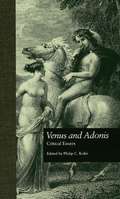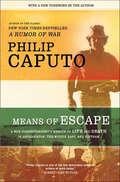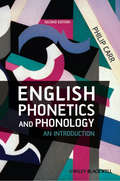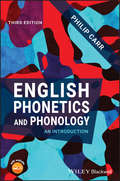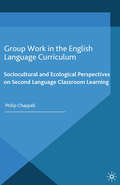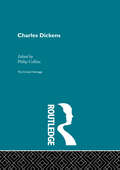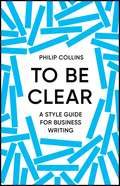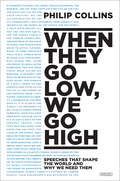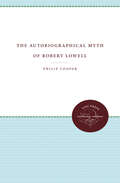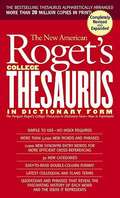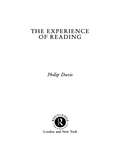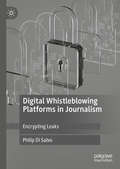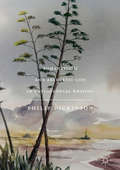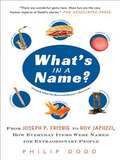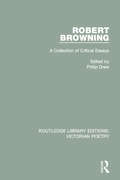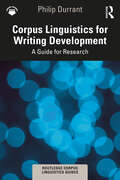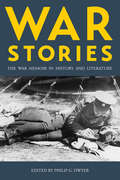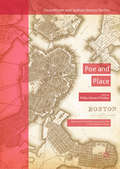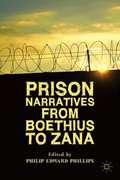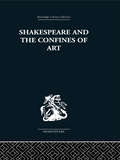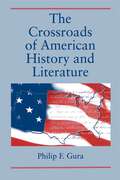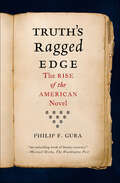- Table View
- List View
Venus and Adonis: Critical Essays (Shakespeare Criticism Ser. #No. 16)
by Philip C. KolinThis is the first collection of critical essays devoted exclusively to Shakespeare's first published work, his long narrative poem Venus and Adonis which established his reputation as the literary darling of London and the heir of Ovid. Particularly important is the book's coverage of the little-known presence of Venus and Adonis on stage.A s
Means of Escape: A War Correspondent's Memoir of Life and Death in Afghanistan, the Middle East, and Vietnam
by Philip Caputo"A riveting memoir of years of living dangerously."—Kirkus ReviewsFor the countless readers who have admired Philip Caputo's classic memoir of Vietnam, A Rumor of War, here is his powerful recounting of his life and adventures, updated with a foreword that assesses the state of the world and the journalist's art. As a journalist, Caputo has covered many of the world's troubles, and in Means of Escape, he tells the reader in moving and clear-eyed prose how he made himself into a writer, traveler, and observer with the nerve to put himself at the center of the world's conflicts. As a young reporter he investigated the Mafia in Chicago, earning acclaim as well as threats against his safety. Later, he rode camels through the desert and enjoyed Bedouin hospitality, was kidnapped and held captive by Islamic extremists, and was targeted and hit by sniper fire in Beirut, with memories of Vietnam never far from the surface. And after it all, he went into Afghanistan. Caputo's goal has always been to bear witness to the crimes, ambitions, fears, ferocities, and hopes of humanity. With Means of Escape, he has done so.
English Phonetics and Phonology: An Introduction
by Philip CarrThe second edition of the popular English Phonetics and Phonology textbook has been extensively updated and expanded to offer greater flexibility for teachers and increased support for non-native speakers studying the sound systems of English. An ideal introduction to the study of the sound systems of English, designed for those with no previous knowledge of the subject Second edition now rigorously updated and expanded to reflect feedback from existing students and to increase support for non-native speakers of English Benefits from a useful introduction to articulatory phonetics, along with coverage of the main aspects of the phonological structure of present-day English Features a completely new chapter on the relationship between English spelling and pronunciation, extended coverage of intonation, and extensive revisions to sections on rhythm, word stress, intonation and varieties of English worldwide Will include invaluable chapter-by-chapter exercises, linked to sound files available on the accompanying website at www.wiley.com/go/carrphonetics (available upon publication)
English Phonetics and Phonology: An Introduction
by Philip CarrA new edition of the popular introductory text on the phonological structure of present-day English. A clear and accessible introductory text on the phonological structure of the English language, English Phonetics and Phonology is an ideal text for those with no prior knowledge of the subject. This market-leading textbook teaches undergraduate students and non-native English speakers the fundamentals of articulatory phonetics and phonology in an engaging, easy-to-understand style. Rigorously expanded to include new materials on first and second language acquisition of English phonetics and phonology, this third edition, English Phonetics and Phonology boasts two new chapters on first-language and second-language acquisition of English phonetics and phonology. By introducing topics such as the mental lexicon and the emergence of phonological rules and representations, and graphophonemic problems in L2 acquisition, these two new chapters have been added to afford greater flexibility for teachers and increased support for non-native English speakers. Expanded website content includes exercise-linked sound files. Based on the author’s 34 years of teaching English Phonetics and Phonology in the UK and France Includes coverage of various accents in English and second-language acquisition Hugely successful textbook for the introductory Phonetics course, now in its third edition References and exercises across all chapters to guide students throughout the work Provides access to companion website for additional learning tools, sound files, and instructor resources English Phonetics and Phonology is an indispensable resource for undergraduate students in courses on Phonetics and Phonology with no prior knowledge of theoretical linguistics and non-native English speakers alike.
Group Work in the English Language Curriculum
by Philip ChappellThis book explores how using small groups in second language classrooms supports language learning. Chappell's experience as a language teacher equips him to present a clear, evidence-based argument for the powerful influence group work has upon the opportunities for learning, and how it should therefore be an integral part of language lessons.
Charles Dickens: The Critical Heritage (Critical Heritage Ser.)
by Philip CollinsThe Critical Heritage gathers together a large body of critical sources on major figures in literature. Each volume presents contemporary responses to a writer's work, enabling students and researchers to read for themselves, for example, comments on early performances of Shakespeare's plays, or reactions to the first publication of Jane Austen's novels.The carefully selected sources range from landmark essays in the history of criticism to journalism and contemporary opinion, and little published documentary material such as letters and diaries. Significant pieces of criticism from later periods are also included, in order to demonstrate the fluctuations in an author's reputation.Each volume contains an introduction to the writer's published works, a selected bibliography, and an index of works, authors and subjects.The Collected Critical Heritage set will be available as a set of 68 volumes and the series will also be available in mini sets selected by period (in slipcase boxes) and as individual volumes.
To Be Clear
by Philip CollinsThe bad reputation many businesses have in our time is intimately connected to the lack of clarity in the language they use. TO BE CLEAR is a call to arms, urging businesses to stop using the language of nonsense and start using language that has clarity and meaning. It's a lucid, entertaining and practical guide for anyone who cares about language to help them improve their communications and thus also their business practices.
To Be Clear
by Philip CollinsThe bad reputation many businesses have in our time is intimately connected to the lack of clarity in the language they use. TO BE CLEAR is a call to arms, urging businesses to stop using the language of nonsense and start using language that has clarity and meaning. It's a lucid, entertaining and practical guide for anyone who cares about language to help them improve their communications and thus also their business practices.
When They Go Low, We Go High: Speeches That Shape the World and Why We Need Them
by Philip CollinsCan a good speech save democracy? “Anyone interested in the past, present and future of speeches and speechwriting will find [this] a fascinating read.” —The SpectatorWhen First Lady Michelle Obama approached the podium at the 2016 Democratic National Convention, nobody could have predicted that her rousing line “When they go low, we go high” would become the motto for the political left and an anthem for opponents of oppression worldwide. It was a speech with the kind of emotional pull rarely heard these days, joining a long list of addresses that have made history. But what was it that made this speech so great?When They Go Low, We Go High explores the most notable speeches in history, analyzing the rhetorical techniques to uncover how the right speech at the right time can profoundly shape the world. Traveling across continents and centuries, political speechwriter Philip Collins reveals what Thomas Jefferson owes to Cicero and Pericles; who really gave the Gettysburg Address; and what Elizabeth I shares with Winston Churchill. In telling the stories of famous and sometimes infamous speeches—including those from Lincoln, Woodrow Wilson, JFK, Martin Luther King, Jr., Disraeli, Hitler, Elie Wiesel, Margaret Thatcher, and Barack and Michelle Obama—Collins breathes new life into words you thought you knew well, telling the story of democracy. Whether it’s the inaugural addresses of presidents or the revolutionary writings of Castro, Pankhurst, and Mandela, Collins illuminates and contextualizes these moments with sensitivity and humor. When They Go Low, We Go High examines the power of public speaking and serves as an urgent reminder that words can change the world.“Hits on three unassailable truths: rhetoric and democracy must go hand-in-hand; democracy, for all of its flaws, is superior to tyranny; and democracy is currently under assault.” —Paste“Collins . . . understands intimately the mechanics of rhetoric. He believes that we, as human beings, possess the capacity to extract ourselves from the swamp in which we have sunk.” —The Times
The Autobiographical Myth of Robert Lowell
by Philip CooperLowell's continuing productivity and his ever-increasing stature as a poet demand a new evaluation of his work, and Cooper has provided it in this penetrating study. Though Cooper's primary purpose is to demonstrate the principle of the interrelation of the poems, a secondary and equally important purpose is to analyze the significance of Lowell's most recent work.Originally published in 1970.A UNC Press Enduring Edition -- UNC Press Enduring Editions use the latest in digital technology to make available again books from our distinguished backlist that were previously out of print. These editions are published unaltered from the original, and are presented in affordable paperback formats, bringing readers both historical and cultural value.
The New American Roget's College Thesaurus: In the Dictionary Form
by Philip D. MoreheadPublished in hardcover as The Penguin Roget's College Thesaurus in Dictionary Form, this new paperback edition of the 20-million-copy bestselling thesaurus has been fully revised, expanded, and updated for the modern home, school, or office. .
Experience Of Reading
by Philip DavisFirst published in 1991. Routledge is an imprint of Taylor & Francis, an informa company.
Digital Whistleblowing Platforms in Journalism: Encrypting Leaks
by Philip Di SalvoThis book analyzes whistleblowing platforms and the adoption of encryption tools in journalism. Whistleblowing platforms are becoming an important phenomenon for journalism in this era and offer safer solutions for communicating with whistleblowers and obtaining leaks. WikiLeaks and the Snowden case have been powerful game changers for today’s journalism, showing the potentials of and needs for encryption for journalistic purposes, together with the perils of surveillance. Whistleblowing platforms are also an interesting example of journalists and hackers coming together to support investigations with new tools and practices. The book introduces this phenomenon and features a qualitative study about whistleblowing platforms and their adoption in the journalistic field.
Romanticism and Aesthetic Life in Postcolonial Writing
by Philip DickinsonThis book explores Romanticism as a force that exerts an insistent but critically neglected pressure on the postcolonial imagination. From the decolonizing poetics of the Caribbean to the white writing of South Africa, from the aesthetics of post-imperial disappointment to postcolonial theory itself, it develops an account of the textual and philosophical interpenetration of postcolonial aesthetics with Romantic ideas about sense, history and world.What emerges is a reading of Romantic/postcolonial co-involvement that moves beyond well-worn models of intercanonical antagonism and the historicizing biases of conventional literary history. Caught somewhere between the effects of reanimation and estrangement, Romanticism appears here not as a stable textual repository prior to the postcolonial, but as echo, spectre, self-interruption, or vital force, that can yet only emerge in the guise of the afterlife, its agency mediated — but never exhausted — by postcolonial writing.
What's in a Name?
by Philip DoddA brilliant and personal literary journey, in which Philip Dodd tells the curious tales of people whose names?deliberately or by chance?became household words What?s in a name? For Philip Dodd, this question led to an international tour, sleuthing the history of some of our most intriguing eponyms. The result is a collection of surprising, stranger-than-fiction stories from history, the arts, the halls of science, and sometimes simply the realm of serendipity. This armchair traveler?s delight contains little-known tales of such immortal figures as: · Roy Jacuzzi, alive and well and still bubbling with ideas in Happy Valley, California · Joseph P. Frisbie, the baker whose pie tins inspired Wham-O?s ubiquitous flying disc · Ernst Gräfenberg, for whom the G-spot was named ? Samuel Maverick, the Texas pioneer who refused to brand his calves · And many other colorful figures From Belgium to Buenos Aires, from Orlando to Los Angeles, Dodd?s readers go along for the ride. What?s In a Name? is a marvelous tribute to people who changed our language?whether through hard work, creativity, or the luck of the draw. .
What's in a Name?
by Philip DoddA brilliant and personal literary journey, in which Philip Dodd tells the curious tales of people whose names?deliberately or by chance?became household words What?s in a name? For Philip Dodd, this question led to an international tour, sleuthing the history of some of our most intriguing eponyms. The result is a collection of surprising, stranger-than-fiction stories from history, the arts, the halls of science, and sometimes simply the realm of serendipity. This armchair traveler?s delight contains little-known tales of such immortal figures as: · Roy Jacuzzi, alive and well and still bubbling with ideas in Happy Valley, California · Joseph P. Frisbie, the baker whose pie tins inspired Wham-O?s ubiquitous flying disc · Ernst Gräfenberg, for whom the G-spot was named ? Samuel Maverick, the Texas pioneer who refused to brand his calves · And many other colorful figures From Belgium to Buenos Aires, from Orlando to Los Angeles, Dodd?s readers go along for the ride. What?s In a Name? is a marvelous tribute to people who changed our language?whether through hard work, creativity, or the luck of the draw.
Robert Browning: A Collection of Critical Essays (Routledge Library Editions: Victorian Poetry #1)
by Philip DrewFirst published in 1966. This title complies a selection of critical articles by various authors on the poetry of Robert Browning. The editor has collected a number of important general studies of Browning’s mind and art by English and American critics, as well as studies on individual poems. This book will be of interest to students of literature.
Corpus Linguistics for Writing Development: A Guide for Research (Routledge Corpus Linguistics Guides)
by Philip DurrantCorpus Linguistics for Writing Development provides a practical introduction to using corpora in the study of first and second language learners’ written language over time and across different levels of proficiency. Focusing on development in the use of vocabulary, formulaic language, and grammar, this book • discusses how corpus research can contribute to our understanding of writing development and to pedagogical practice; • reviews a range of corpus techniques for studying writing development from the perspectives of vocabulary, grammar, and formulaic language and interrogates the methodological bases of those techniques; and • guides readers to perform practical analyses of learner writing using the R open-source programming language. Aimed at the novice researcher, this book will be key reading for advanced undergraduate and postgraduate students in the fields of education, language, and linguistics. It will be of particular interest to those interested in first or second language writing, language assessment, and learner corpus research.
War Stories: The War Memoir in History and Literature
by Philip DwyerAlthough war memoirs constitute a rich, varied literary form, they are often dismissed by historians as unreliable. This collection of essays is one of the first to explore the modern war memoir, revealing the genre’s surprising capacity for breadth and sophistication while remaining sensitive to the challenges it poses for scholars. Covering conflicts from the Napoleonic era to today, the studies gathered here consider how memoirs have been used to transmit particular views of war even as they have emerged within specific social and political contexts.
Poe and Place (Geocriticism and Spatial Literary Studies)
by Philip Edward PhillipsThis collection of fifteen original essays and one original poem explores the theme of “place” in the life, works, and afterlife of Edgar A. Poe (1809-1849). Poe and Place argues that “place” is an important critical category through which to understand this classic American author in new and interesting ways. The geographical “places” examined include the cities in which Poe lived and worked, specific locales included in his fictional works, imaginary places featured in his writings, physical and imaginary places and spaces from which he departed and those to which he sought to return, places he claimed to have gone, and places that have embraced him as their own. The geo-critical and geo-spatial perspectives in the collection offer fresh readings of Poe and provide readers new vantage points from which to approach Poe’s life, literary works, aesthetic concerns, and cultural afterlife.
Prison Narratives from Boethius to Zana
by Philip Edward PhillipsPrison Narratives from Boethius to Zana critically examines selected works of writers, from the sixth century to the twenty-first century, who were imprisoned for their beliefs. Chapters explore figures' lives, provide close analyses of their works, and offer contextualization of their prison writings.
Shakespeare and the Confines of Art
by Philip EdwardsFirst published in 1968. By selective study of certain of the comedies, tragedies and sonnets, Philip Edwards views Shakespeare's work as a whole and explains why his art developed as it did. The work which the author sees Shakespeare striving to create is the perfect fusion of comedy and tragedy and he suggests that we are watching the progress of a mind as acutely conscious as anyone today of the disorder and lack of meaning in the world. Nevertheless, it remains faithful to the possibility that within the imaginable forms of drama there exists that play which will satisfy the basic human need for reassurance, order and control.
Metaphor and Writing: Figurative Thought in the Discourse of Written Communication
by Philip EubanksThis volume explains how metaphors, metonymies, and other figures of thought interact cognitively and rhetorically to tell us what writing is and what it should do. Drawing on interviews with writing professionals and published commentary about writing, it argues that our everyday metaphors and metonymies for writing are part of a figurative rhetoric of writing - a pattern of discourse and thought that includes ways we categorize writers and writing; stories we tell about people who write; conceptual metaphors and metonymies used both to describe and to guide writing; and familiar, yet surprisingly adaptable, conceptual blends used routinely for imagining writing situations. The book will give scholars a fresh understanding of concepts such as 'voice', 'self', 'clarity', 'power', and the most basic figure of all: 'the writer'.
The Crossroads of American History and Literature
by Philip F. GuraThe Crossroads of American History and Literature collects two decades' worth of the best-known essays of Philip F. Gura. Beginning with a definitive overview of studies of colonial literature, Gura ranges through such subjects in colonial American history as the intellectual life of the Connecticut River Valley, Cotton Mather's understanding of political leadership, and the religious upheavals of the Great Awakening. In the nineteenth century, he visits such varied topics as the history of print culture in rural communities, the philological interests of the Transcendentalist Elizabeth Peabody, the craft and business of the early Amerian music trades, and Thoreau's interest in exploration literature and in the Native American. Displaying remarkable sophistication in a variety of fields that, taken together, constitute the heart of American Studies, this collection illustrates the complexity of American cultural history.
Truth's Ragged Edge: The Rise of the American Novel
by Philip F. GuraFrom the acclaimed cultural historian Philip F. Gura comes Truth's Ragged Edge, a comprehensive and original history of the American novel's first century. Grounded in Gura's extensive consideration of the diverse range of important early novels, not just those that remain widely read today, this book recovers many long-neglected but influential writers—such as the escaped slave Harriet Jacobs, the free black Philadelphian Frank J. Webb, and the irrepressible John Neal—to paint a complete and authoritative portrait of the era. Gura also gives us the key to understanding what sets the early novel apart, arguing that it is distinguished by its roots in "the fundamental religiosity of American life." Our nation's pioneering novelists, it turns out, wrote less in the service of art than of morality.This history begins with a series of firsts: the very first American novel, William Hill Brown's The Power of Sympathy, published in 1789; the first bestsellers, Susanna Rowson's Charlotte Temple and Hannah Webster Foster's The Coquette, novels that were, like Brown's, cautionary tales of seduction and betrayal; and the first native genre, religious tracts, which were parables intended to instruct the Christian reader. Gura shows that the novel did not leave behind its proselytizing purpose, even as it evolved. We see Catharine Maria Sedgwick in the 1820s conceiving of A New-England Tale as a critique of Puritanism's harsh strictures, as well as novelists pushing secular causes: George Lippard's The Quaker City, from 1844, was a dark warning about growing social inequality. In the next decade certain writers—Hawthorne and Melville most famously—began to depict interiority and doubt, and in doing so nurtured a broader cultural shift, from social concern to individualism, from faith in a distant god to faith in the self.Rich in subplots and detail, Gura's narrative includes enlightening discussions of the technologies that modernized publishing and allowed for the printing of novels on a mass scale, and of the lively cultural journals and literary salons of early nineteenth-century New York and Boston. A book for the reader of history no less than the reader of fiction, Truth's Ragged Edge—the title drawn from a phrase in Melville, about the ambiguity of truth—is an indispensable guide to the fascinating, unexpected origins of the American novel.
